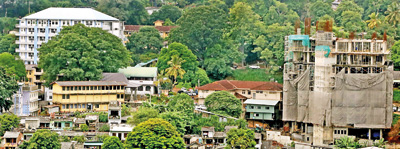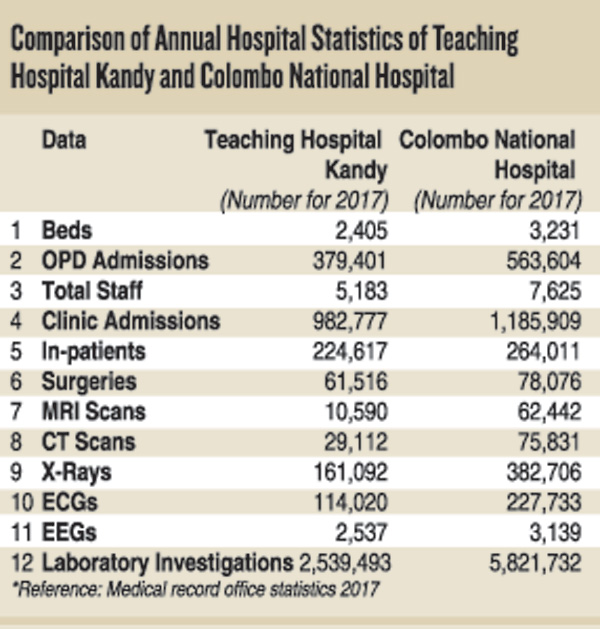News
Kandy Teaching Hospital gets status of ‘National Hospital’
The Kandy Teaching Hospital has joined the exclusive ranks of ‘National Hospitals’ – just the second to be declared as such in the country after the National Hospital of Colombo.

View from the top of the sprawling Kandy Hospital. Pic by M.A. Pushpa Kumara
A veritable lifeline to a large catchment area, the 2,500-bed newly-declared National Hospital of Kandy serves patients not only from the Central Province but also from Sabaragamuwa, Uva, North Central Province, North Western Province, Northern Province and Eastern Province. This amounts to seven of the nine provinces and about 60 per cent of the country’s population, the Sunday Times learns.
“This is a vindication of the silent service we have been providing for a long time,” said Kandy Hospital Director Dr. Saman Ratnayake, adding that Cabinet approval giving National Hospital status to Kandy was granted this Tuesday (October 15).
Explaining that the hospital’s vision has become a reality with the support of Health Minister Dr. Rajitha Senaratne, the Director said that the annual budgetary allocation, the funds available for tender procurements and the cadres of administrative staff will now increase substantially allowing the fine-tuning of the efficient and effective service that is already being provided.
“A National Hospital in Kandy would be a blessing to the rural population and plantation workers, the majority of whom are underprivileged and low-income earners,” said Dr. Ratnayake, bringing out images of men, women and children living in remote and inaccessible areas far away from public highways.
The loss of valuable time could mean the fine line between life and death. Think of a patient being transported from Batticaloa or Ampara to the Colombo National Hospital. There would be several hours of travelling and this means inevitable delay, high transport costs and physical discomfort, although the patient needs to rest and be administered medication without loss of time, he reiterates.
He is also quick to point out that the Kandy Hospital is the leading multi-organ transplant centre of the country, having performed the first-ever heart transplant in Sri Lanka. “We also have the expertise and facilities for kidney, liver and pancreas transplants and are currently working on a lung transplant programme which we will launch shortly.”
“We will be able to take the service we provide to a higher level with our new status,” said Dr. Ratnayake pointing out that as a Teaching Hospital earlier they worked with Rs. 10 million for tender procurements, an annual budgetary allocation of Rs. 9 billion and a smaller administrative staff.
Currently, the hospital is administered by a Director, two Deputy Directors, three hospital secretaries and two accountants, the Sunday Times learns. This capacity is set to increase with mature and efficient administrators in the form of a very senior Deputy Director-General being placed at the helm with the other human resource personnel cadre also increasing.
With Kandy Hospital being recognized as an end-station and a referral centre of excellence, the benefits to patients will be immense, the Sunday Times understands with all services being provided under ‘one roof’.
With the hospital being upgraded, teachers and researchers in the medical and related fields, who otherwise will have to travel to Colombo, will also gain more opportunities to use the state-of-the-art facilities and resources here, he said.
This is while, an impetus will also be provided for the improvement of the private sector medical service.
Referring to why it is justified in upgrading the Kandy Teaching Hospital to a National Hospital, Director Dr. Ratnayake said it had “crucial” geographic placement as it was a tertiary referral centre for about 60 per cent of the country’s population.
Some of the many plus points are:
- While all the major specialities including paediatrics, gynaecology & obstetrics, cardiology, neurology, nephrology, ophthalmology (eye), oncology (cancer), psychiatry are available at the Kandy Hospital, it also has almost all the finer specialties, 69 so far, under one roof. These facilities include treatment for complex orthopaedic conditions, snake-bites and those who attempt self-harm, to name a few.
- It has the second largest human resource deployment in the curative sector – about 125 Consultants, 1,000 Medical Officers, 2,225 nurses, 70 medical laboratory technicians (MLTs), 70 pharmacists, 35 physiotherapists, 45 radiographers and 45 midwives.
- The extensive infrastructure facilities include a bed-strength of 2,500 (the number set to increase to 3,000 with more units coming up); 78 wards; 24 operating theatres; 13 special investigation/treatment units; 11 Intensive Care Units and a large Out-Patient Department and clinics. It is a leading renal care unit, incomparable to any other facility in the country.
- It is a well-reputed training centre for undergraduate and post-graduate medical doctors, with about 400 medical students and about 100 post-graduate trainees.
- It is a leading training centre for nursing, paramedical and supplementary medicine personnel with about 500 students under supervised training.
- It is a leading multi-disciplinary research centre, with collaborations with the Universities of Peradeniya, Jaffna, Batticaloa and Wayamba and the Kandy Nurses Training School.
Dr. Ratnayake says that the Kandy Hospital is also a vibrant centre of patient welfare, with a Cancer Home, Kidney Treatment Concessionary Centre etc., while on the cards for the future are apex centres under the Cardiology JICA Project, a sophisticated Laboratory Complex, a Thalassaemia and Bone Marrow Transplant Unit, a Cancer Treatment Centre with all facilities, a Stroke Unit and a Maternity Supercentre.
“We are a reputed hospital trusted by the people around the country,” says Dr. Ratnayake, adding that the challenge in the future will be for all staff across the board, not only to maintain and sustain but also keep reaching the stars with regard to patient treatment and care with transparency, efficiency, efficacy and humanity.


